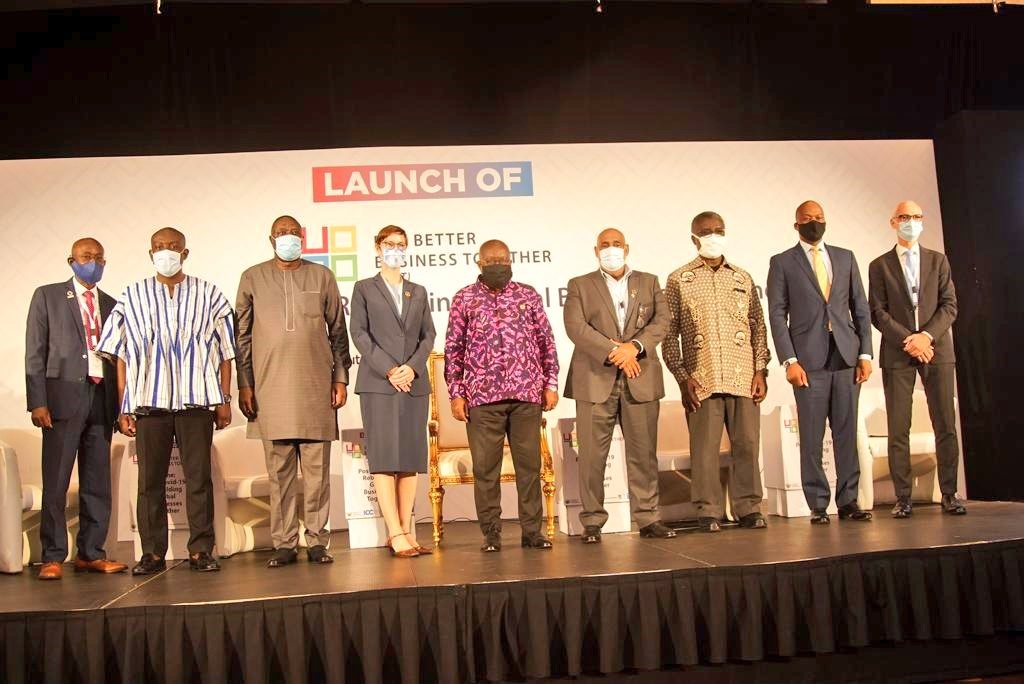President Nana Addo Dankwa Akufo–Addo has charged financial institutions to take a relook at the profiling of youth-owned businesses and start-ups in the country, and find some avenues to extend credit to them as the advent of technology has brought with it the opportunity to create global giants out of them in the near future.
Speaking at the launch of an economic recovery programme dubbed ‘For Better Business Together (4BBT)’, aimed at advancing the United Nations Sustainable Development Goals and strengthening business opportunities in Ghana, the president said that one of the ways to ensure resilient global businesses is to support youthful enterprises and start-ups.
“Venture capital firms, angel investors, fund managers, banks and other financial institutions need to re-examine their positions on youth-owned business and extend credit to them. The notion that youth-owned businesses and start-ups are high risks should be looked at again.
“The youth are the future of business and must be regarded as an important resource for the development of resilient global businesses. We need to help develop the entrepreneurship mind-set of young people, as youth entrepreneurship is a vital component of economic growth, development and transformation,” President Akufo–Addo noted.
The president, who is currently co-chair of the UN Sustainable Development Goals, added that implementation of the African Continental Free Trade Agreement (AfCFTA) brings with it a fine opportunity for the continent to come together and change its economic future.
“We in Africa have been presented with an excellent opportunity with the coming into force of the African Continental Free Trade Area, whose secretariat is here in Accra, to recover from effects of the pandemic, boost economic activity and grow our business.
“When you consider the fact that trade between African countries remains low, currently standing at some 16 percent combining our GDP, compared to the other parts of the world like the European Union 75 percent, it is obvious that these very low levels of intra-regional trade constitutes one of the defining characteristics of the continent’s continuing poverty. They hinder Africa’s prospects for bringing prosperity to its people.”
President Akufo–Addo also said that amidst the global economic challenges business leaders need to “find a balance between profitability, viability, employee safety and happiness” while they map out strategies to navigate the adverse impact of COVID-19 and develop new operational measures.
“These are defining moments, and business organisations must endeavour to commit to broader goals – including sustainability, social justice and attainment of the United Nation’s 2030 Sustainable Development Goals.

“Restructuring the global financing architecture to enable access to fresh capital by developing nations is now more than ever another such priority that is of immediate necessity, if the gains chalked up in transforming our respective economies are not to be eroded and the standard of living for our people is not to be dangerously lowered,” President Akufo-Addo emphasised.
Prime Minister of Norway
The Prime Minister of Norway, Erna Solberg – who gave her remarks through a digital format, was happywith the collaborations secured to draft the programme. According to her, even though COVID-19 has brought with it some severe global economic challenges, private public partnership like this will help economies to recover earlier than anticipated.
“To reach the Global Sustainable Development Goals, we are dependent on the private sector. Governments cannot do it alone. We are entering a decade of action for all of us, an era wherein all stakeholders must take part,” said Prime Minister Solberg, who is also co-chair of the UN Sustainable Development Goals.
“To reach our goals, we need to harness the business sector’s capacity. We need new technologies, and your ability to integrate and adapt. We need you to see the potential in entrepreneurs and new ideas,” she said.
The 4BBT
The 4BBT economic recovery programme is an initiative that came to fruition with the collaboration between the Ministry of Business Development, International Chamber of Commerce (ICC), United Nations Development Programme (UNDP) and Business for Peace Foundation (BPF). The programme comprises global and local initiatives being built to support economic recovery and strengthen the sustainability and resilience of businesses for the future.
The initiatives under the 4BBT umbrella include the establishment of a Centre for Entrepreneurship by the International Chamber of Commerce in Ghana; development of SDG-investor maps by the United Nations Development Programme; and the provision of support for SMEs through the COVID-19 Private Sector Global Facility and ICC’s global ‘Save Our SMEs’ campaign.
The 4BBT will also act as a springboard for the global launch of Business for Peace’s Future of Business programme. The launch yesterday marked the 20th anniversary of the United Nations Global Compact, an initiative driven by the former U.N. Secretary General and Ghanaian diplomat Kofi Annan.










